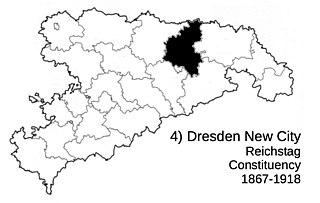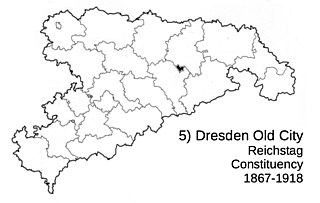
The Glauchau-Meerane Reichstag constituency was constituency No. 17 in the Kingdom of Saxony which returned a deputy to the German Reichstag. It included Glauchau, Meerane and Hohenstein-Ernstthal located in Chemnitzer Land.
Following the North German Confederation Treaty, the Kingdom of Saxony entered the North German Confederation in 1866. [1] As a consequence, the Kingdom returned Deputies to the Reichstag of the North German Confederation. After the founding of the German Empire on 18 January 1871, the deputies were returned to the Reichstag of the German Empire. [2] Following this, Saxony participated in Reichstag elections from February 1867. Glauchau-Meerane returned a series of Reichstag Deputies until 1919 when the existing constituencies were scrapped.[ citation needed ]
The deputies elected for the Glauchau-Meerane Reichstag constituency were as follows:
| North German Federation | |||
|---|---|---|---|
| Election | Reichstag Deputy | Party | |
| February 1867* | 1st | August Bebel | Saxon People's Party |
| August 1867 | 2nd | August Bebel | Saxon People's Party |
| Reichstag of the German Empire | |||
| 1871 | 1st | August Bebel | Social Democratic Workers' Party of Germany |
| 1874 | 2nd | Wilhelm Bracke | Socialist Workers' Party of Germany (1875) |
| 1877 | 3rd | Wilhelm Bracke | Socialist Workers' Party of Germany |
| 1878 | 4th | Wilhelm Bracke | Socialist Workers' Party of Germany |
| 1881 | 5th | Friedrich Ludwig Leuschner | National Liberal Party |
| 1884 | 6th | Ignaz Auer | Socialist Workers' Party of Germany |
| 1887 | 7th | Friedrich Ludwig Leuschner | National Liberal Party |
| 1890 | 8th | Ignaz Auer | Socialist Workers' Party of Germany |
| 1893 | 9th | Ignaz Auer | Social Democratic Party of Germany |
| 1898 | 10th | Ignaz Auer | Social Democratic Party of Germany |
| 1903 | 11th | Ignaz Auer | Social Democratic Party of Germany |
| 1907 | 12th | Ignaz Auer* | Social Democratic Party of Germany |
| 1912 | 13th | Hermann Molkenbuhr | Social Democratic Party of Germany |
| * died 10 April 1907 | |||





